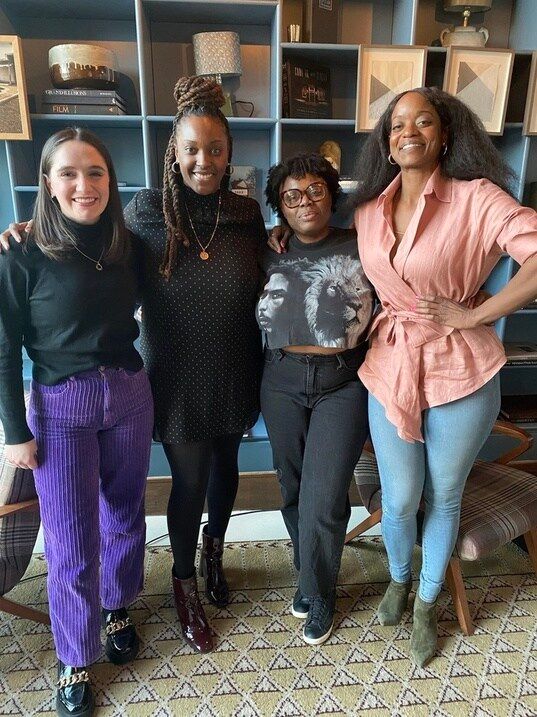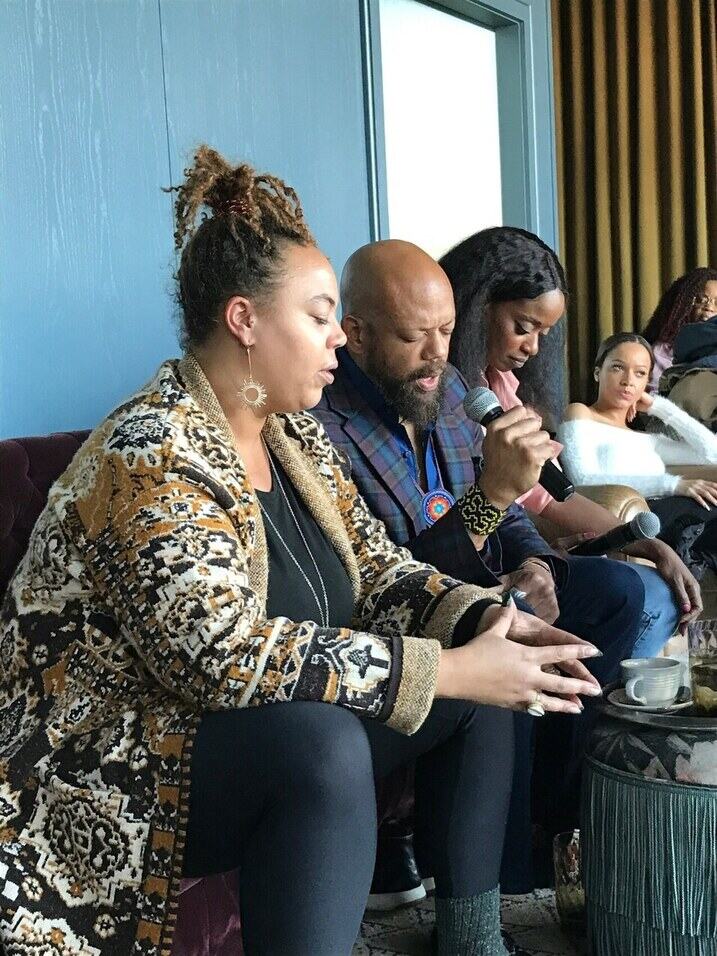As a perfect ending to Black History Month, cannabis organization Cannaclusive invited Honeysuckle to their event at New York's elite venue Soho House. Called Sacred Earth Medicine, the event was hosted in partnership with The Ancestor Project, a collective that believes in the healing and transformative powers of psilocybin, ibogaine, peyote, and other psychedelics to reduce harm and expand consciousness.
Mary Pryor, Co-Founder of Cannaclusive, led an open discussion with Charlotte James and Undrea Wright of The Ancestor Project about ancestral knowledge, practices, and the benefits of Sacred Earth Medicine in the form of psychedelics.

What is Cannaclusive?
Cannaclusive was created to remedy the lack of fair representation of cannabis consumers from marginalized groups. Pryor, along with her co-founders Tonya Flash and Charlese Antoinette, recognized that while opportunities related to cannabis seemed to be expanding, they largely excluded people who have historically been underrepresented such as BIPOC. They facilitate educational events, and carefully curated content that reflects the diversity that exists in this thriving industry. They hold corporations accountable for valuing the input of marginalized people and not treating them as an afterthought. Their findings can be found on The Accountability List, a database of information about diversity in the employees of cannabis businesses, among other things. They also host a collection of diverse cannabis stock images on their site.

Who is Mary Pryor?
Co-founder Mary Pryor, a proud native Detroiter, and multi-hyphenate businesswoman, is an inspiration. She is a co-founder of Cannaclusive, New York chapter president of Minorities for Medical Marijuana; and chief marketing officer for Tonic CBD and Tricolla Farms among other roles.
Pryor spoke with me last month in an interview featured in our latest print issue! Check out our candid conversation about diversity, equity, and inclusion in the cannabis industry!

What is The Ancestor Project?
"We believe that by working with our Sacred Earth Medicine allies, we can use our personal radical transformations to co-create our collective liberation."
The Ancestor Project is a platform aimed at reclaiming the traditional application of psychedelics as a sacred ceremonial practice. They do this by redefining the substances as Sacred Earth Medicine: "a transformative and integrative medicine that uses plant-based extracts and ingredients". Their website states "we believe Sacred Earth Medicine is key in liberating all oppressed peoples". The organization focuses on giving people the resources to intentionally curate a relationship with the medicine as "plant allies" on a journey towards personally transforming in the name of collective liberation. They seek to teach people to heal themselves and reconnect to their ancestor's practice of maintaining a respectful reciprocal relationship with the earth.
They provide virtual and in-person educational opportunities, as well as guided legal plant medicine ceremonies in the Baltimore, MD area. Their approach is three-pronged: Education, Integration, and then Legal Ceremony.
Who are Charlotte James and Undrea Wright?
Before founding The Ancestor Project, Charlotte James worked as a harm reductionist. Due to feelings of burnout, she left the harm reduction field and began on a path that would lead her back to plant medicine. After her own journey of reclaiming her relationship to Sacred Earth Medicine, she is reembarking on a path towards reducing harm by sharing that journey with others. According to her bio, James works to "create a world in which everyone is able to live in the fearless pursuit of their radical transformation". She uses her skills as a digital strategist, coach, and space holder to build and engage a community focused on pursuing equitable liberation.
Undrea Wright came to the project after working to heal himself with sacred medicines for over 11 years. He is a cannabis business owner who was a key part of the decriminalization and medical cannabis bill passing in Maryland. Having worked in a variety of roles throughout the cannabis industry, his most recent initiative before working with the Ancestor Project was co-founding The Sabina Project, a program based around Black-led psychedelic education.
Wright brings his focus on equity and inclusion to all modalities of healing work and communities. Wright practices in the traditional Amazonian ways, informed by the South American Shipibo-Conibo and Quechua-Lamista lineages, having trained with various global Indigenous masters. He believes that the core of the practice is a transformation of consciousness, that transcends ego-centric mindsets, that will lead to the end of systems of oppression,
Sacred Earth Medicine and Psychedelic Education at Soho House: Event Recap
Tucked into an intimate corner of the Brooklyn iteration of the exclusive members-only club Soho House, Sacred Earth Medicine was a welcoming event. Conversations and introductions competed against the DJ in the ironically named library room; a curtain the only veil between us and the lively brunch crowd. The small group quietly gathered around in a circle as our hosts began to prepare themselves for the ceremony to come.

The smells of sage and palo santo filled the room, filtering through the air as they fanned the smoke over each other and an almost reverent quiet fell over the room. The trio sat together after moving a small altar to the center of the circle. As Wright and Brown continued to prepare, Pryor began to speak. "There is no particular look or feel to plant medicine. We need to destigmatize what that looks like." Pryor got candid about the role psychedelics like LSD and psilocybin have played in helping her heal. "And I say that with pride!" she exclaimed confidently.
She listed the more recognizable names of psychedelics: ayahuasca, LSD, DMT, and psilocybin. The contemporary reputation of these herbs is suffering from the narrative of psychedelics as a path to self-actualization or a party drug executives in Silicon Valley abuse. Wright and Brown are working to rectify that reputation, by creating a platform that prioritizes the use of plant medicine in the way they've been traditionally used — in sacred ceremonies, often in communities of color —with intentions set on liberating all oppressed peoples. While their three-pronged approach to sacred medicine is aimed at reconnecting people with their purposes, it is so that they can be better prepared to dismantle systems of oppression, not to serve selfish goals. This event was part of their agenda of reclaiming the narrative of sacred plant medicine as a conduit for transformation and liberation.

Before they began, they explained what the plant medicine featured on the altar was. Surrounded by a tall white pillar candle, a bottle of Agua de Florida and other ritual tools were vials of the plants they were going to be self-administering in various forms. Brown pointed out the herbs, naming them and explaining the purpose behind them. The herb Rapeh, also known as “grandfather tobacco” or "shamanic snuff," is a form of tobacco native to the Amazon, that when used intentionally can help with grounding and clearing your mind to receive messages. It is the herb they use to open the ceremony, following it with Kambo, also known as “frog medicine”, the venomous secretion of a frog also native to the Amazon. Both of these are legal to plant medicine in the United States. Wright and Brown opened the ceremony with a rousing sacred song.

The ceremony began with them self-administering the smokable herbal blends with the aid of a tool called a Kuripe. As they took turns, the three looked decidedly uncomfortable as they initially took in the smoke. As James blinked away tears, Wright explained that discomfort, and learning to sit and center yourself through it, is a part of the ritual. As the medicines took effect, both James and Wright continued to delve into the cultural significance of the medicine and the ceremony. James and Wright see reclaiming psychedelic use as an ancestral practice as a form of harm reduction for communities of color, something James has carried over from her previous vocation in the field.
Despite the rising popularity of psychedelics both as a recreational substance and an alternative to opioid addiction, our hosts reiterated their desire to reclaim the practice as a healing modality and a rite of passage to come to our ancestral ways. "Colonization separates us, and plant medicine brings us back together. It's the spirit of the medicine" said Wright. They also warned against the potential harm with the medicalization of the plant to treat things like drug addiction and mental illness.
When asked during the Q&A segment if there was a safe way to completely legalize the use of plant medicine and integrate it into the mainstream, Brown said "Yes, but we need to be careful if it is going to be medicalized,", pointing to places like Portland and Portugal as examples. However, with medicalization, plant medicine could become legal in the clinical sense but continually criminalized in the ceremonial sense. Medicalization and commodifying plant medicine could also have a negative effect on accessibility. In terms of the legal use of the plant, there are countries where psychedelic use thrives in legal gray zones. However, in those places, plant medicine is largely used ceremoniously and imposing regulations could lead to further commercialization.
Ready to embark on your own journey?
If you are interested in learning more about the resources the Ancestor Project has to offer check out their website, where they post about educational events and in-person ceremonies they hold in the Baltimore Area.



